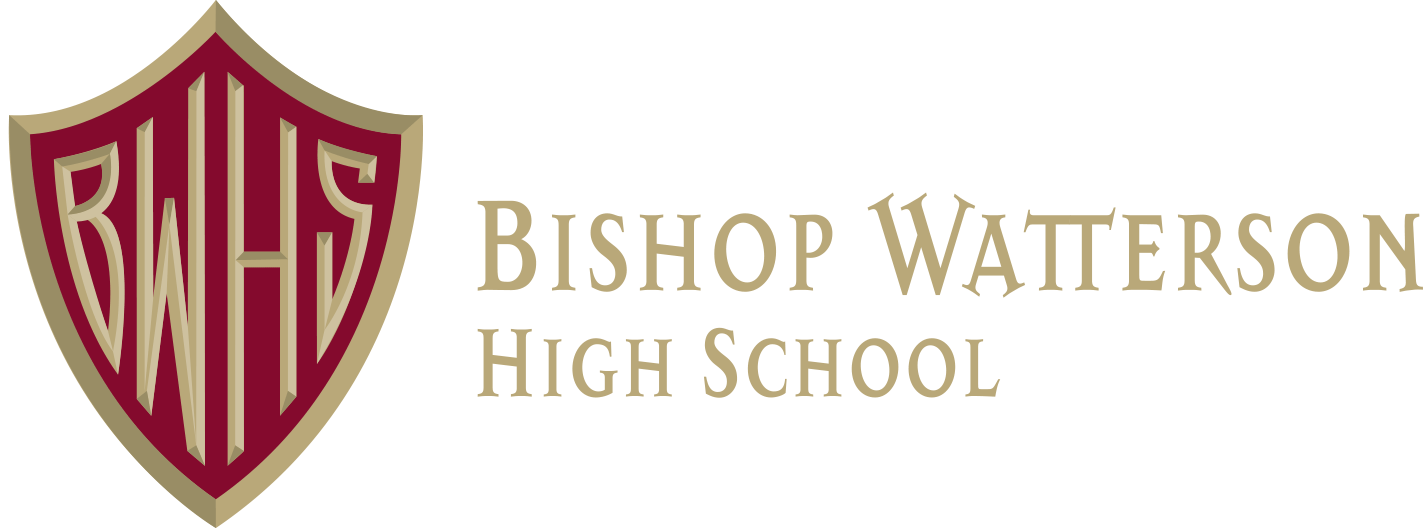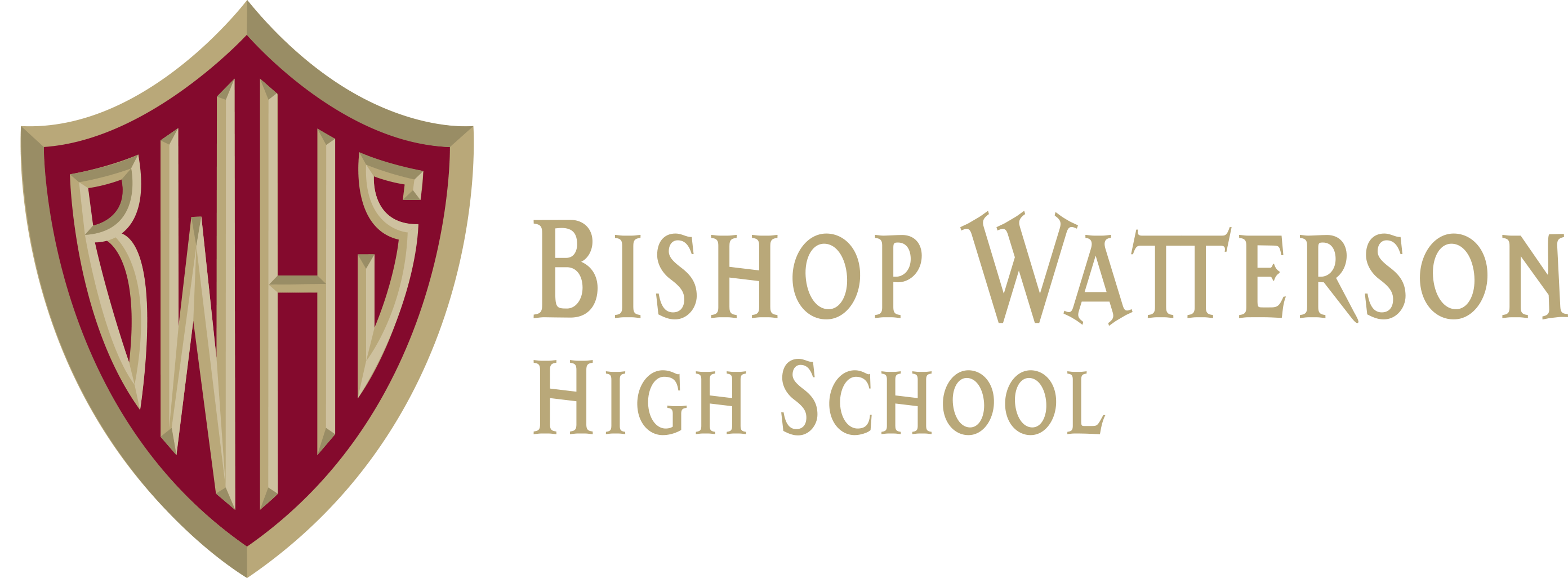Planned Giving

Bishop Watterson High School is proud to introduce the St. John Paul II Legacy Society. We are pleased to grant special recognition to those donors who have demonstrated a commitment to the future of our school with a gift to our planned giving program. Considering the level of commitment and enthusiasm Bishop Watterson alumni have for their alma mater, planning a future gift to any of our endowments can be surprisingly affordable and an easy way to leave a legacy. Your support is vital to our efforts to sustain the strength of the Bishop Watterson tradition.
Membership Criteria:
Membership in the St. John Paul II Legacy Society can be attained in two ways:
- A current gift or planned future gift to our endowment of $10,000 or more, and/or
- A beneficiary designation to Bishop Watterson using any of the methods listed
Membership Benefits:
Membership in this Legacy Society includes the following benefits:
- Upon enrollment you will receive a special honorary gift.
- Appropriate donor recognition and special event invitations
- Establish a lasting legacy at Bishop Watterson
What to Give:
Cash
A gift of cash, by check or by credit card, is perhaps the simplest way to make a donation. Cash donations of $10,000 or more can be used to create a scholarship in your name, your family’s name, or for some other designated honoree. Also, you can determine the basis upon which future scholarship grants will be awarded. Cash gifts of less than $10,000 can be made to existing Bishop Watterson scholarship funds.
Securities
One of the most common assets donated to a charity is stock that has appreciated in value and has been held by the donor for more than a year. Such donations are common for two reasons. First, you may avoid paying capital gains tax on the increase in the value of the stock; and second, you may receive a tax deduction based on the value of stock at the time of the donation. For a closely-held corporation, there must be no restrictions on transfer of the stock for charitable purpose.
Real Estate
Another asset often used for charitable donations is real estate that has appreciated in value. As with a gift of stock, you may avoid payment of income tax on the appreciation in the value of the real estate and you may receive a charitable deduction on the donation.
Life Insurance
If you own a life insurance policy that has accumulated cash value, you may make a donation to Bishop Watterson in two ways. First, you can designate Bishop Watterson as the primary beneficiary under the policy. Upon your death, the death benefit will be paid to the school. Alternatively, you can designate Bishop Watterson as the primary beneficiary under the policy and assign ownership of the policy to the school during your lifetime. You may obtain a charitable deduction by transferring ownership of the policy to Bishop Watterson.
Retirement Plan Assets
Retirement plan assets such as pension funds or IRAs often are good assets to donate to Bishop Watterson. The assets may be taxable if transferred to an heir, but would not taxable if donated to the school. You can designate the school to be the primary beneficiary for a stated percentage of the retirement funds, or you can designate the school as the contingent beneficiary, e.g., if your spouse does not survive you, then the funds are paid to Bishop Watterson.
IRS Required Minimum Distributions
The IRS requires all individuals’ ages 70 ½ and older to distribute a minimum amount of their IRA, 401K or retirement account each year. This annual required minimum distribution (RMD) is then taxed to you as ordinary income. However, new federal legislation enacted in response to the 2013 “fiscal cliff” allows you to gift all or part of this RMD directly to Bishop Watterson. By electing this gifting method, the ordinary income will be completely omitted from your tax return, thus guaranteeing a reduction of your income taxes.
Savings Bonds
Generally, interest income from savings bonds is taxed to you when the bonds are redeemed and cannot be transferred to Bishop Watterson during your lifetime. However, if you cash in a savings bond and donate the proceeds to the school, a charitable deduction against the interest income may be available. Should you leave a savings bond to Bishop Watterson through your will, the school would receive the full value of the bond without taxation.
How to Give:
Bequests
A bequest in your will is one of the most common ways of making an endowed gift to Bishop Watterson High School. The bequest may donate a specific dollar amount, a percentage of your estate, a specific asset, the remainder of your estate after specific bequests to loved ones are fulfilled, or be contingent upon identified loved ones predeceasing you. You must specify in the bequest if you desire that the bequest be an endowment gift- that the principal of the asset will be preserved and the income produced by the asset used to fund scholarships, facilities, current expenses, etc.
Bequest language can be as simple as:
“I, [name], of [city, state, zip], give, devise, and bequeath to Bishop Watterson High School [lump sum, or % of my estate, or description of property] for its unrestricted use and purpose.”
Charitable Gift Annuities
A charitable gift annuity is a contract you enter into with Bishop Watterson. You transfer cash or property to the school in exchange for a lifetime stream of annual income to the school. You may receive a tax deduction at the time you enter into the contract with Bishop Watterson High School. Upon your death, the cash/property goes to the school.
Charitable Remainder Trusts
A charitable remainder trust is a trust established by you to provide income to you (or a beneficiary designated by you) during the life of the trust. At the termination of the trust, the remaining cash/property (securities or real estate) is distributed to you annually can be a fixed amount (“annuity trust”) or a variable amount based on a defined percentage of the trust principal (“unitrust”). You may be able to claim a partial charitable tax deduction and may not have to pay an immediate capital gains tax if the trust converts an appreciated asset to cash.
Retained Life Estate
You can donate your home to Bishop Watterson High School, retaining a “life estate” for yourself and your spouse. You and your spouse retain the right to live in the house of your lifetimes. At the same time, you may qualify for a substantial tax deduction in the year you make the donation to the school. The appreciation in the value of the house is not subject to capital gains tax that may otherwise be payable to you.
Charitable Lead Trust
Pursuant to a charitable lead trust, Bishop Watterson High School receives annual payments during the life of the trust, either a fixed amount (“charitable lead annuity trust”) or a variable amount based on a fixed percentage of trust principal (“charitable lead unitrust”). The principal remaining in the trust after completion of the annual payments to Bishop Watterson is distributed to you or persons you designate.
If you designate yourself to receive the remainder of the trust principal (“grantor lead trust”), you are taxed on the income from the property held in trust. You are entitled to claim an income tax deduction for the present value of the income payments to Bishop Watterson High School.
If you designate other persons, such as your family, to receive the remainder of the trust principal (“nongrantor” or “family lead trust”), you do not qualify for an income tax deduction. But you receive a charitable gift tax deduction for the present value of Bishop Watterson High School’s interest.
If you would like to discuss how you can participate in this opportunity to leave a legacy, please contact Tyler Johnston, tjohnston@bwhs.org. Once a gift is agreed upon, we pledge to make sure the purpose of your gift is understood by Bishop Watterson and will include you as a member of the St. John Paul II Legacy Society.

